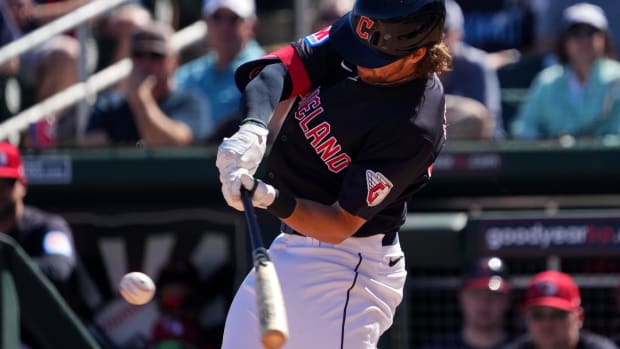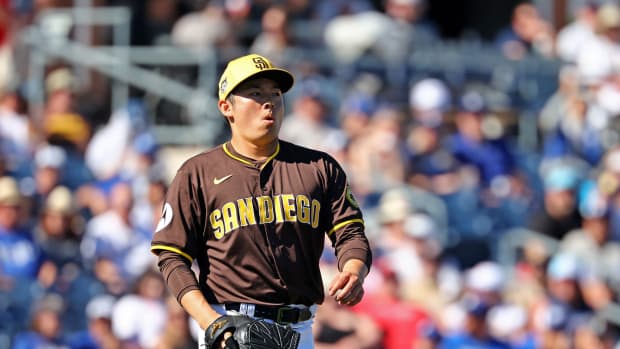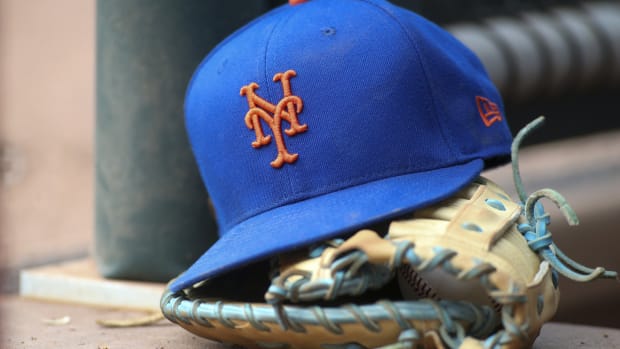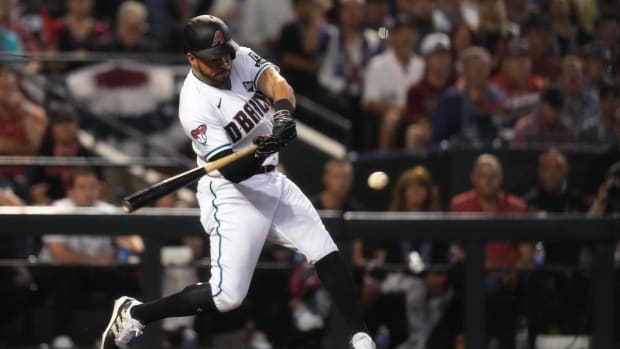MLB tips its hand with reaction to latest Alex Rodriguez suspension comments
Alex Rodriguez's stop with the Trenton Thunder could be his last taste of baseball action for a long time. (Tom Mihalek/AP)
Alex Rodriguez has apparently hurt Major League Baseball's feelings. After the first game of his latest rehab assignment on Friday night, the embattled slugger suggested that the league and the Yankees are conspiring to keep him off the field. Via the latest report from the New York Daily News, because of his "explosive comments" MLB is no longer willing to negotiate a settlement regarding his suspension for his connections to the Biogenesis clinic and will hand down a 214-game ban on Monday, covering the remainder of this season and all of next.
The buried lede from that story is that MLB appears to be backing off from its attempt to ban Rodriguez for life. That move would require commissioner Bud Selig to do a potentially risky end run around the Joint Drug Agreement by invoking powers set down in the Collective Bargaining Agreement. If Rodriguez is penalized under the JDA, MLB can hand down the ban, but he would still have the right to an appeal that would be heard by federal arbitrator Frederic Horowitz. Rodriguez would also have the right to play until that appeal is heard. If he's suspended under the CBA's "just cause" provision for conduct "materially detrimental or materially prejudicial to baseball," he would be entitled to a hearing in front of the arbitrator. If he's suspended under the "best interests of baseball" clause, Selig would serve as arbitrator, but would risk a federal court case or the reopening of the CBA.
Friday night's game in Trenton marked the first game of Rodriguez's second rehab stint. Still working his way back from January surgery to repair his torn hip labrum, he had last played on July 20 and was poised to rejoin the Yankees on July 22; instead he was diagnosed with a Grade I quad strain that shut him down but hardly shut him up. With some 150 members of the media in attendance for his latest return, he homered and drew a walk in his three plate appearances. The real fireworks came via what he told reporters after the game:
"There is more than one party that benefits from me not ever stepping back on the field. And that's not my teammates and it's not the Yankee fans...I think it is pretty self-explanatory. I think that is the pink elephant in the room. I think we all agree that we want to get rid of PEDs. That's a must. I think all the players, we feel that way. But when all this stuff is going on in the background and people are finding creative ways to cancel your contract and stuff like that, I think that's concerning for me, it's concerning for present - and I think it should be concerning for future players, as well.''
Rodriguez painting himself as a player concerned about getting rid of performance-enhancing drugs is a laugh given his previous admission to having used them during the 2001-2003 period, not to mention the likelihood that MLB at least has enough evidence to suspend him for 50 games via the evidence they've accumulated in their investigation. That said, his implication that the Yankees are working in concert with the league has to rankle the higher-ups in both organizations. If the league were to have success in banning A-Rod, the Yankees would be freed from paying around $95 million remaining on his $275 million contract, giving them considerable payroll flexibility at a time when the consequences of their aging, expensive roster have been laid bare. At 56-52, the team is in fourth place in the AL East, four games out in the wild-card race, with a decrepit offense and a payroll that continues to increase via the addition of bad contracts from past-prime players such as Vernon Wells and Alfonso Soriano.
According to Saturday's Daily News report from Bill Madden, Michael O'Keeffe and Teri Thompson, in the wake of Friday night's comments, the league has "rejected Rodriguez’s request to negotiate a suspension settlement, a baseball source familiar with the situation said." Furthermore:
According to the source, Players Association chief Michael Weiner reached out to MLB on behalf of Rodriguez Saturday morning in an attempt to talk settlement but was told that baseball is no longer interested in negotiating with the disgraced third baseman.
"They asked for a meeting this morning and were told 'no,'" said the source. "Baseball is more than comfortable with what they have."
Another source told the Daily News that despite accusing the Yankees Friday of trying to get out from under his contract, Rodriguez also reached out to the club Saturday in an attempt to discuss negotiating a settlement on the remaining $100 million the Yankees owe A-Rod. The Yankees also declined to talk with Rodriguez about his contract, according to the source, telling him this is a drug issue under the purview of MLB.
Aside from a link to an older report, nowhere in the latest Daily News piece is there an indication that Selig is continuing to seek a lifetime ban. Elsewhere within the report, the Rodriguez camp is said to have offered for the slugger to serve an 80-to-100 game suspension and then retire, with the expectation that he would receive the money remaining on his contract. That 80-to-100 game range would appear to come from the JDA's Section 7F, pertaining to a first offense for "Participation in the Sale or Distribution of a Prohibited Substance," which would connect to allegations that Rodriguez steered other players seeking PEDs towards the Biogenesis clinic. Rodriguez is also alleged to have lied to investigators about his connections to the clinic and to have obstructed the investigation by purchasing documents from a former clinic employee in order to destroy them. The evidence of his wrongdoing has not been made public, but it appears to rely on the testimony and actions of Biogenesis founder Anthony Bosch, whom the league has portrayed as a disreputable lowlife.
That 80-to-100 game offer would appear to contradict information in a report from ESPN's T.J. Quinn and Andrew Marchand:
A source told ESPN New York that MLB offered to drop any lifetime bans if Rodriguez accepted giving an arbitrator the flexibility to charge him with more than a 50-game suspension.
A source said that Rodriguez's side "unequivocally" turned down the offer, pointing to clause 7G of the Joint Drug agreement that states that PED users can "only" be hit with a 50-game suspension.
In any event, the battle between the Yankees and Rodriguez has already taken some surreal turns during his rehab. After he jumped the gun by announcing his clearance to return to game activity on June 25, general manager Brian Cashman told him to "shut the f**k up" during an interview with ESPN New York. More recently, after being diagnosed with his quad strain, Rodriguez found a doctor willing to say that he did not see such a strain on his MRI; not only had this Doctor Michael Gross not examined him, he had previously been fined $40,000 by the New Jersey attorney general for "failing to adequately ensure proper patient treatment involving the prescribing of hormones including steroids."
For all of that absurdity, Rodriguez is entitled to due process. In recent weeks, leaks from MLB sources have illustrated that him having a fair say was far lower on their list of priorities than scoring political points by publicly shaming him and portraying the commissioner in a flattering light for his belated attempt to clean up the game. On Saturday, the Washington Post's Sally Jenkins summarized the current state of play:
The ritualistic rage at Alex Rodriguez feels less like justice than a public stoning, and it’s Exhibit A that the moral crusade against performance enhancement is as unhealthy as the thing it purports to correct. Whatever Rodriguez’s transgressions, is he really so much more culpable than any number of the people he played with or for, including baseball Commissioner Bud Selig, who makes his living off the sweat of other men’s bodies and whose apparent idea of justice is to use the threat of a lifetime ban as a publicity tactic?
A-Rod is either deserving of a lifetime ban or he’s not. He may very well have done everything he is accused of, but what we have here isn’t a genuine assessment of his offenses but rather a squeeze play by Selig, an attempt to pressure A-Rod into forgoing his due process. Whatever the evidence against Rodriguez in the Biogenesis affair — and it may be significant — the commissioner is unmistakably less interested in a fitting penalty than he is in shutting up A-Rod — and at the same time bolstering his own weak reputation on PEDs.
MLB has attempted to pressure Rodriguez into agreeing to a suspension through the 2014 season in order to avoid a lifetime ban, but if the league believes it must negotiate over whether his transgressions actually meet such a standard, then it's likely that they don't. The vast majority of players banned for life by previous commissioners were banned for betting on baseball and thereby threatening the integrity of the sport. Two players banned for illegal drug use, pitchers Fergie Jenkins and Steve Howe, were soon reinstated via arbitration.
MLB has already suspended two players in connection with Biogenesis. The Brewers' Ryan Braun drew a 65-game suspension -- the remainder of the season at the time the ban was handed down -- with MLB justifying the length as 50 games for the equivalent of a first-time offense under the Joint Drug Agreement and the other 15 games for disparaging comments about MLB's testing program during the grievance proceedings from his 2011 positive test. Cesar Carrillo, who as a minor leaguer was not protected by the players' union, drew a 100-game suspension, 50 for being named in the Biogenesis documents and 50 "for lying to MLB about knowing Bosch."
Over the last few days, the league was said to be working towards suspending nine other players besides Rodriguez, all of them for 50 games, and is currently planning to announce those suspensions on Monday, which would give players time to serve the entire suspensions before the end of the regular season. Quinn and Marchand reported that there could be as many as 12 players suspended. Whatever the number, it is possible that players could appeal those suspensions, in which case they would play until Horowitz heard their appeal; that would likely push their suspensions into next season, which could harm the free agent contracts of players such as Nelson Cruz and Jhonny Peralta but allow them to continue playing for teams fighting for playoff spots.
The league apparently held up their announcement of the suspensions while attempting to get Rodriguez to fall in line and accept a stronger punishment, thus wrapping up this saga with a single dog-and-pony show. That appears increasingly unlikely given his vow to fight any sanction. Clearly Rodriguez won't conform to anyone's wishes that he go quietly, and again it's apparent that we're far from the end of this saga.
UPDATE: On Saturday night, in the second and final game of his rehab assignment for Trenton, Rodriguez walked in all four plate appearances. His plan is to work out on Sunday at an undisclosed location and then to travel to Chicago to meet the Yankees for a three-game series against the White Sox. However, according to a report from Yahoo! Sports' Jeff Passan, the league plans to suspend Rodriguez on Monday, "using both the collective-bargaining agreement, which would banish Rodriguez immediately and keep him off the field before his planned return from injury that day, as well as the joint drug agreement, sources said." However, if that happens, the union could go to an arbitrator to request a stay of the penalty, which if granted would allow Rodriguez to play.




































